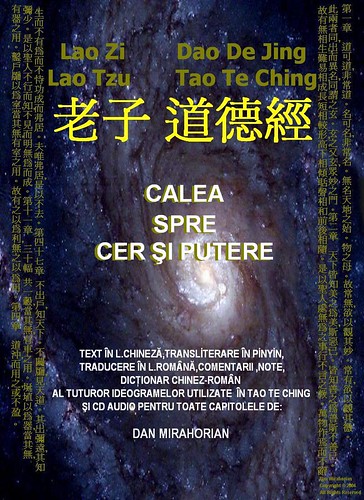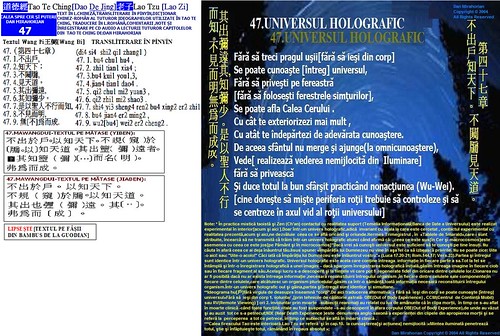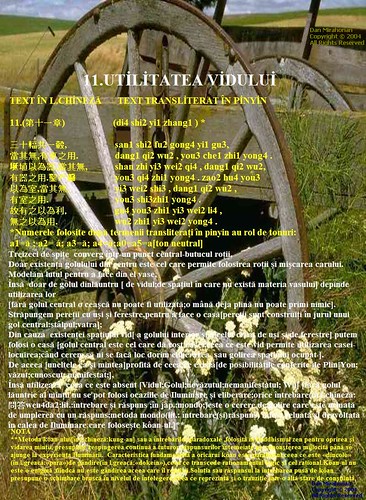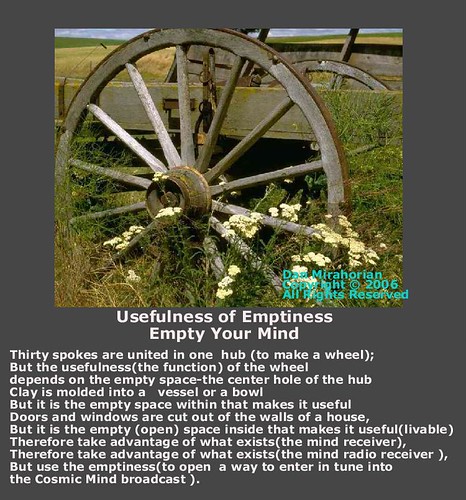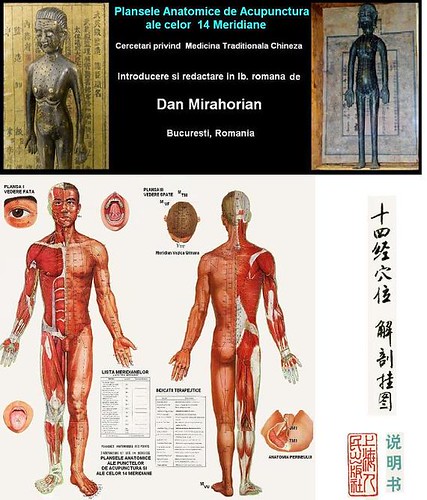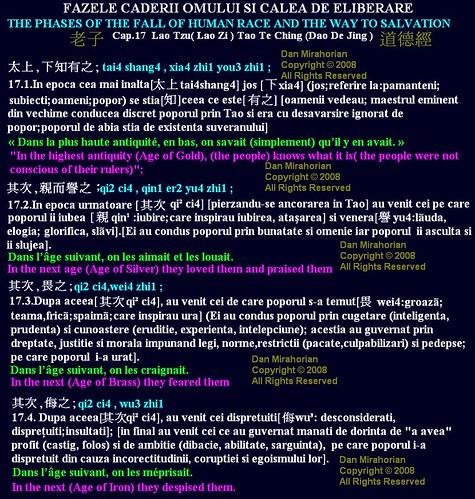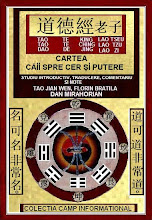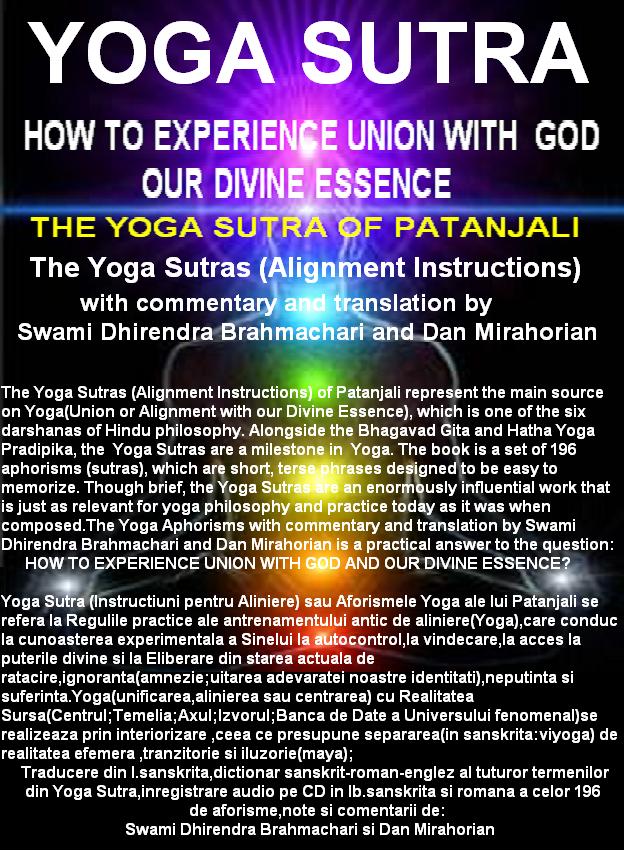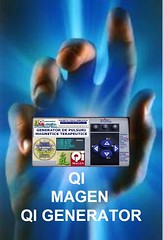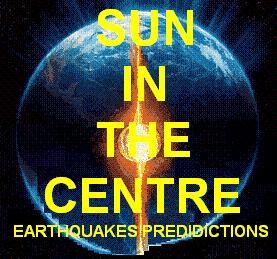1.Cele patru trepte ale Instrainarii omului
Caderea din Cer sau pierderea contactului cu Adevarata realitate nu s-a produs instantaneu, ci progresiv si a condus la "Caderea in multiplicitate-spargerea unitatii"
"Separarea in eu si tu" sau "caderea in iluzia existentei separate" este efectul pierderii vederii nemijlocite sau a ancorarii in Tao
Traditia hindusa folosea o scara similara pt. a ilustra cele patru trepte de Instrainare a omului , trepte de degradare care sunt insotite de modificari ale ierarhiei valorice , ale idealurilor de viata si in final conduc la mentinerea in prizonieratul cercului vicios al autodistrugeri, al autoanihilarii unui individ sau a unei civilizatii;analizati caracteristicile celor patru ere (yuga), caracteristicile alimentatiei in diferite ere si la diferite caste , motivatiile si cele patru obiective de viata ale fiecareia dintre cele patru caste(vedeti imaginea de mai jos)
2.Fazele degradarii ancorarii in TAO
-ancorare in Tao[maestrul eminent din vechime conducea discret poporul prin Tao si era cu desavarsire ignorat de popor iar poporul de abia stia de existenta suveranului]
-ancorare in iubire[apoi au venit cei ce au guvernat prin iubire (bunatate, omenie si dreptate), pe care poporul ii iubea si cinstea];
-ancorare in frica [au urmat apoi cei ce au guvernat poporul ancorati in dreptate, justitie si morala impunand legi, norme, restrictii(pacate,culpabilizari) si pedepse exemplare intemeindu-se pe (inteligenta, prudenta) si cunoastere (eruditie, experienta,intelepciune) de care poporul se temea si pe care ii ura];
-ancorarea in castigul material [in final au venit cei ce au guvernat manati de dorinta de "a avea" profit (castig, folos) si de ambitie (dibacie, abilitate, sarguinta), pe care poporul ii dispretuia din cauza incorectitudinii, coruptiei si egoismului lor].comert-totul este transformat in marfa,totul se vinde si se cumpara"totul are un pret";everithing has a prize"
太上,下知有之; tai4 shang4 , xia4 zhi1 you3 zhi1 ;
其次,親而譽之;qi2 ci4 , qin1 er2 yu4 zhi1 ;
其次,畏之;其次,侮之.qi2 ci4,wei4 zhi1 ; qi2 ci4 , wu3 zhi1
信不足,焉有不信焉.xin4 bu4 zu2,yan1 you3 bu4 xin4 yan1
悠兮其貴言,功成 you1 xi1 qi2 gui4 yan2 , gong1 cheng2
事遂,百姓皆謂:我自然. shi4 sui4 , bai3 xing4 jie1 wei4:wo3 zi4 ran2 .
太上,下知有之; tai4 shang4 , xia4 zhi1 you3 zhi1 ;
17.1.In epoca cea mai inalta[太上tai4shang4] jos [下xia4] (jos;referire la:pamanteni;subiecti;oameni;popor) se stia[知 ]ceea ce este[有之] [oamenii vedeau; maestrul eminent din vechime conducea discret poporul prin Tao si era cu desavarsire ignorat de popor;poporul de abia stia de existenta suveranului]
« Dans la plus haute antiquité, en bas, on savait (simplement) qu’il y en avait. »
其次,親而譽之; qi2 ci4 , qin1 er2 yu4 zhi1 ;
17.2.In epoca urmatoare [其次qi² ci4] [pierzandu-se ancorarea in Tao] au venit cei pe care poporul ii iubea[親qin¹ :iubire;care inspirau iubirea, ataşarea] si venera[譽yu4:lãuda, elogia; glorifica, slãvi].
[Ei au condus poporul prin bunatate si omenie iar poporul ii asculta si ii slujea].
Dans l’âge suivant, on les aimait et les louait.
其次,畏之; qi2 ci4,wei4 zhi1 ;
17.3.Dupa aceea[其次qi² ci4], au venit cei de care poporul s-a temut[畏wei4:groazã; teama,fricã;spaimã;care inspirau ura]
(Ei au condus poporul prin cugetare (inteligenta, prudenta) si cunoastere (eruditie, experienta, intelepciune); acestia au guvernat prin dreptate, justitie si morala impunand legi, norme,restrictii (pacate,culpabilizari) si pedepse; pe care poporul i-a urat].
Dans l’âge suivant, on les craignait.
其次,侮之. qi2 ci4 , wu3 zhi1.
17.4. Dupa aceea[其次qi² ci4] au venit cei dispretuiti[侮wu³:desconsiderati, dispreţuiti;insultati];
[in final au venit cei ce au guvernat manati de dorinta de "a avea" profit (castig, folos) si de ambitie (dibacie, abilitate, sarguinta), pe care poporul i-a dispretuit din cauza incorectitudinii, coruptiei si egoismului lor].
Dans l’âge suivant, on les méprisait.
信不足, xin4 bu4 zu2,
17.5.Daca suveranul nu este capabil de [足zu²] incredere[信xin4 : credinta fidelitate,loialitate] [suficienta in poporul sau;daca nu actioneaza dezinteresat si nu-si insoteste cuvintele frumoase (promisiunile) de fapte],
Lorsque la bonne foi (du prince envers le peuple) n’est pas suffisante,
焉有不信焉. yan1 you3 bu4 xin4 yan1
17.6.De unde[焉yan¹ : cum?de ce? unde?; nu se poate astepta ] sa trezeasca[有you³ a avea;a exista;a se manifesta] increderea[信xin4 : credinta fidelitatea,loialitatea] [poporului in suveran; sa obtina ordinea si pacea sociala].
y il a manque de bonne foi (du peuple envers le prince).
悠兮其貴言, you1 xi1 qi2 gui4 yan2 ,
17.7.De aceea maestrul eminent din vechime [antichitate] aprecia[貴 gui4scump;drag;costisitor;apreciat, a onora] masura [悠 you¹:tăcut;
a (se) gândi,a meditativ,chibzuit;prevazator,cuprinzãtor; vast] la vorba[言yán² : vorbire,cuvânt,limbaj;limbă;comunicare verbală] [se abtinea sa vorbeasca si sa se manifeste; era grav si rezervat].
Comme (les princes sages) étaient pensifs et prisaient leurs mots !
功成 事遂, gong1 cheng2 shi4 sui4 ,
17.8.Iar cand opera sa [功 gong¹ ] era implinita [成cheng² :completa, împlinita, desăvârşita;dusa la capăt;gata;perfecta,întreaga, terminată) si sarcina sa [事 shi4 ] progresa[遂sui4]
Quand le travail était accompli et que tout marchait bien,
百姓皆謂:我自然. bai3 xing4 jie1 wei4:wo3 zi4 ran2 .
17.9.[in consecinta] poporul[百姓. bai³ xing4 mulţimea familiilor] împreună[皆jie¹] gandea [謂wei4]:„Noi[我 wo³ :spunea] insine am faptuit asta firesc” [自然zi4 ran² tzu jan: de la sine; insine;natura in ea insasi”;spontan;forta imanenta spontana(Akira Ohama)] [supusii imperiului castigau merite si foloase (satisfactii) imaginandu-si ca ei au faptuit totul, din propia lor vointa ,in mod natural, firesc, de la sine].[acum castiga frustari]
[en consequence] le peuple disait : « Nous l’avons fait de nous-mêmes ! »
Variante de traducere ale capitolului 17
17 Sentence 1
Beck: The best leaders the people barely know. The next best they love and praise. The next they fear. And the next they hate.
Blackney As for him who is highest, The people just know he is there. His deputy's cherished and praised; Of the third, they are frightened; The fourth, they despise and revile.
Bynner A leader is best When the people barely know that he exists, Not so good when people obey and acclaim him, Worst when they despise him.
Byrn The best leaders are those the people hardly know exist. The next best is a leader who is loved and praised. Next comes the one who is feared. The worst one is the leader that is despised.
Chan The best (rulers) are those whose existence is (merely) known by the people. The next best are those who are loved and praised. The next are those who are feared. And the next are those who are despised.
Cleary Very great leaders in their domains are only known to exist. Those next best are loved and praised. The lesser are feared and despised.
Crowley In the Age of Gold, the people were not conscious of their rulers; in the Age of Silver, they loved them, with songs; In the Age of Brass, they feared them; in the Age of Iron, they despised them.
Hansen The best hierarchy is one those below realize is there. Next to that is one that you feel kin to and extol. Next to that is one you dread. Next to that is one you contemn.
LaFargue The greatest ruler: those under him only know he exists the next best kind: they love and praise him the next: they are in awe of him the next: they despise him.
Legge In the highest antiquity, (the people) did not know that there were (their rulers). In the next age they loved them and praised them. In the next they feared them; in the next they despised them.
Lindauer The very highest, little knowledge is present of it That next is attached to yet praised That next is respected That next is despised.
LinYutan The people (only) know that they exist; The next best the love and praise; The next they fear; And the next they revile.
Mabry The best leader is one that the people are barely aware of. The next best is one who is loved and praised by the people. Next comes one who is feared. Worst is one who is despised.
McDonald Of the best the people hardly ever know they exist; The next best they flock to and praise for nothing. The next they shrink from; the next get reviled.
Merel The best rulers are scarcely known by their subjects; The next best are loved and praised; The next are feared; The next despised:
Mitchell When the Master governs, the people are hardly aware that he exists. Next best is a leader who is loved. Next, one who is feared. The worst is one who is despised.
Muller From great antiquity forth they have known and possessed it. Those of the next level loved and praised it. The next were in awe of it. And the next despised it.
Red Pine During the High Ages people knew they were there then people loved and praised them then they feared them finally they despised them
Ta-Kao The great rulers - the people do not notice their existence; The lesser ones - they attach to and praise them; The still lesser ones - they fear them; The still lesser ones - they despise them.
Walker The best leader is one whose existence is barely known. Next best is one who is lived and praised. Next is one who is feared. Worst of all is a leader who is despised.
Wayism
Wieger In the early days (when, in human affairs, everything still conformed to the action of the Principle), subjects scarcely knew that they had a prince (so discreet was the action of the latter). After this the people loved and flattered their prince (because of his good deeds), but later on, they feared him (because of his laws), and scorned him (because of his unjust acts).
World The best leaders are in harmony with their followers. The next best are those who are respected. Then comes those who are feared. The worst are those who are despised.
Wu The highest type of ruler is one of whose existence the people are barely aware. Next comes one whom they love and praise. Next comes one whom they fear. Next comes one whom they despise and defy.
Ch. 17
Sentence 2
Beck
Those who lack trust will not be trusted. Then they resort to promises.
Blackney
If you trust people less than enough, Some of them never trust you.
Bynner
'Fail to honour people, They fail to honour you;'
Byrn
If you don't trust the people, they will become untrustworthy.
Chan
It is only when one does not have enough faith in others that others will have no faith in him.
Cleary
Therefore when faith is insufficient and there is disbelief,
Crowley
As the rulers lost Confidence, so also did the people lose confidence in them.
Hansen
When reliability is inadequate in it There will be unreliability in it.
LaFargue
When sincerity does not suffice it was not sincerity.
Legge
Thus it was that when faith (in the Tao) was deficient (in the rulers) a want of faith in them ensued (in the people).
Lindauer
Where there is belief without enough within A lack of believing what is within is present.
LinYutan
When they do not command the people's faith, Some will lose faith in them, And then they resort to oaths!
Mabry
If the leader does not have enough faith in his people, They will not have faith in him.
McDonald
"Not believing people you turn them into liars" - such bosses don't command the people's faith. They lose faith in them and take to oaths!
Merel
They have no faith in their people, And their people become unfaithful to them.
Mitchell
If you don't trust the people, you make them untrustworthy.
Muller
If you lack sincerity no one will believe you.
Red Pine
when honesty fails dishonesty prevails
Ta-Kao
For where faith is lacking, It cannot be met by faith.
Walker
If you fail to trust people, they won't turn out to be trustworthy.
Wayism
Wieger
They became disloyal, though having been treated disloyally. They lost confidence in him though receiving only good words which were never put into effect.
World
If one perceives others as untrustworthy, then that will be the experience that one acknowledges. The selective acknowledgment of untrustworthiness verifies one's perception of the untrustworthiness of others.
Wu
When you are lacking in faith, Others will be unfaithful to you.
Ch. 17
Sentence 3
Beck
But when they accomplish their task and complete their work, the people say, "We did it ourselves."
Blackney
He is aloof, as if his talk Were priced beyond the purchasing; But once his project is contrived, The folk will want to say of it: "Of course! We did it by ourselves!"
Bynner
But of a good leader, who talks little, When his work is done, his aim fulfilled, They will all say, 'We did this ourselves.'
Byrn
The best leaders value their words, and use them sparingly. When she has accomplished her task, the people say, "Amazing: we did it, all by ourselves!"
Chan
(The great rulers) value their words highly. They accomplish their task; they complete their work. Nevertheless their people say that they simply follow Nature.
Cleary
it is from the high value placed on words. Works are accomplished, tasks are completed, and ordinary folk all say they are acting spontaneously.
Crowley
How hesitating did they seem, the Lords of the Age of Gold, speaking with deliberation, aware of the weight of their world! Thus they accomplished all things with success; and the people deemed their well-being to be the natural course of events.
Hansen
Reflectively! His ennobling of language. Works are completed; affairs proceed And the hundred surnames all call this 'our nature (our own doing)'
LaFargue
("Reticent - he is sparing with words.") He achieves successes he accomplishes his tasks and the hundred clans all say: We are just being natural.
Legge
How irresolute did those (earliest rulers) appear, showing (by their reticence) the importance which they set upon their words! Their work was done and their undertakings were successful, while the people all said, 'We are as we are, of ourselves!'
Lindauer
So remote, those treasure words Outstanding service performed, efforts successful the one hundred families say We did it naturally.
LinYutan
But (of the best) when their task is accomplished, their work done, The people all remark, "We have done it ourselves."
Mabry
The best leader puts great value in words and says little So that when his work is finished The people all say, "We did it ourselves!"
McDonald
The wise man is a clever ruler; he values his words highly. It's so hard to get a single word from at any price that when his task is finished, a work well done, everyone says, "It happened by itself, and we did it."
Merel
When the best rulers achieve their purpose Their subjects claim the achievement as their own.
Mitchell
The Master doesn't talk, he acts. When his work is done, the people say, "Amazing: we did it, all by ourselves!"
Muller
How careful she is with her precious words! When her work is complete and her job is finished, Everybody says: "We did it!"
Red Pine
hesitate and guard your words when their work succeeds let people think they did it
Ta-Kao
Now how much importance must be attributed to words!
Walker
Therefore, guide others by quietly relying on Tao. Then, when the work is done, the people can say, "We did this ourselves."
Wayism
Wieger
How delicate was the touch of ancient rulers. When everything prospered under their administration, the people believed they had done everything themselves, of their own free will.
World
When the leaders are in harmony with their followers, few laws are necessary and all tasks are accomplished with ease. The followers, not perceiving the administration of leadership, marvel at the manifestationsof harmony and experience a sense of self worth.
Wu
The Sage is self-effacing and scanty of words. When his task is accomplished and things have been completed, All the people say, "We ourselves have achieved it!"
Beck When the great Way is forgotten, the doctrines of humanity and morality arise.
Blackney The mighty Way declined among the folk And then came kindness and morality.
Bynner When people lost sight of the way to live Came codes of love and honesty,
Byrn When the great Tao is abandoned, charity and righteousness appear.
Chan When the great Tao declined, The doctrine of humanity and righteousness arose.
Cleary When the Great Way is deserted, then there is humanitarian duty.
Crowley When men abandoned the Way of Dao, benevolence and justice became necessary.
Hansen When the great guide is cast aside you will have 'humanity' and 'morality.'
LaFargue When Great Tao vanished we got 'Goodness and Morality.'
Legge When the Great Tao (Way or Method) ceased to be observed, benevolence and righteousness came into vogue.
Lindauer Great tao discarded, a presence of humanity, morality
LinYutan On the decline of the great Tao, The doctrine of "humanity" and "justice" arose.
Mabry When the great Tao is abandoned, Ideas of "humanitarianism" and "righteousness" appear.
McDonald When the great dao declined, jen and I arose, humanity and righteousness."
Merel When the Way is forgotten Duty and justice appear;
Mitchell When the great Tao is forgotten goodness and piety appear.
Muller When the great Tao perishes There is jen and justice.
Red Pine When the Great Way disappears we meet kindness and justice
Ta-Kao When the great Tao is lost, spring forth benevolence and righteousness.
Walker When people lose sight of the Tao, codes of morality and justice are created.
Wayism
Wieger When action conforming to the Principle dwindles, (when men cease to act with spontaneous goodness and fairness), artificial principles of goodness and fairness, prudence and wisdom (are invented).
World When the oneness of Infinity is forgotten, judgment appears and people are distinguished as good and righteous.
Wu When the Great Tao was abandoned, There appeared humanity and justice.

